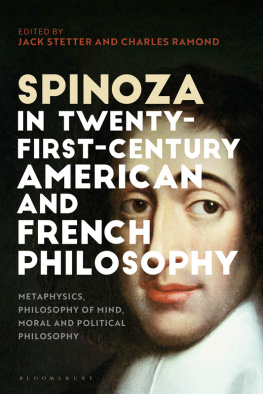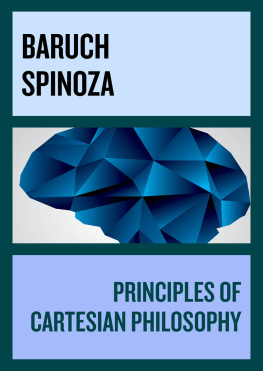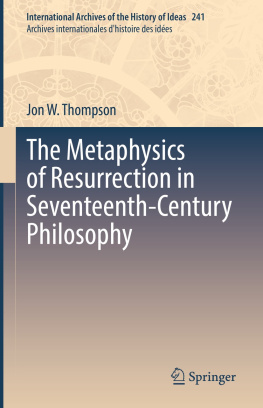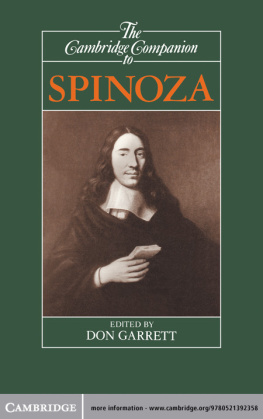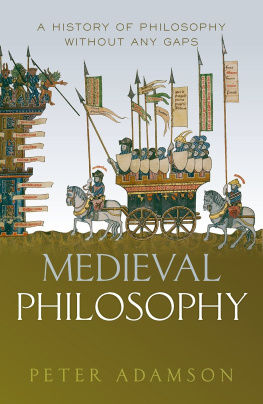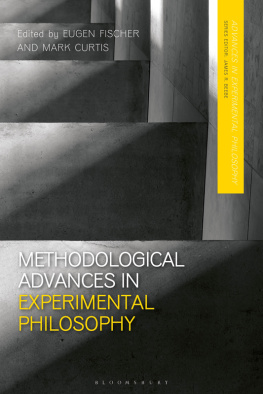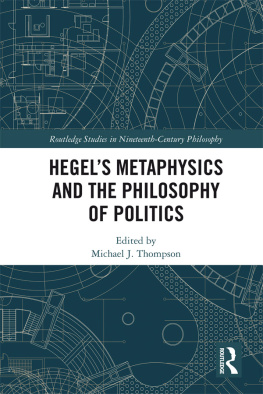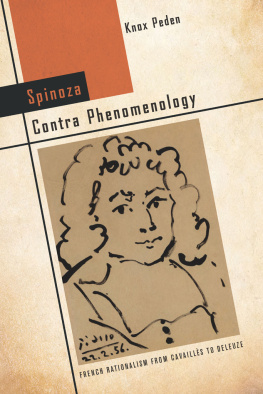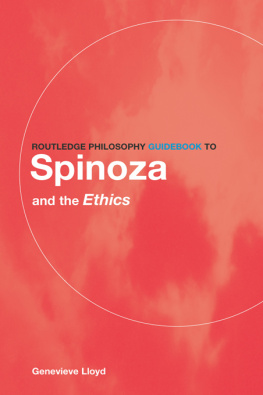Spinoza in Twenty-First-Century
American and French Philosophy
Also available from Bloomsbury
Adventures with the Theory of the Baroque and French Philosophy, by Nadir Lahiji
Kants Transition Project and Late Philosophy, by Oliver Thorndike
Humes Reception in Early America, edited by Mark G. Spencer
The Bloomsbury Companion to Spinoza, edited by Wiep van Bunge, Henri Krop, Piet Streenbakkers, and Jeroen van de Ven
Spinoza in Twenty-First-Century
American and French Philosophy
Metaphysics, Philosophy of Mind,
Moral and Political Philosophy
Edited by
Jack Stetter and Charles Ramond

Seeing that both American and French approaches to Spinoza were particularly strong, it appeared to us that the time had come to bring them into discussion with one another. Broadly speaking, the volumes contents can be grouped into four categories, each of which corresponds to a major domain in Spinozas philosophy: metaphysics, philosophy of mind, moral philosophy, and political philosophy. Each paper by an English-speaking philosopher is followed by a commentary by a French-speaking philosopher. The papers themselves are bold and rigorous statements in Spinoza scholarship, some of which are sure to elicit much further commentary down the line, hopefully on both sides of the Atlantic. The commentaries give the English-speaking reader a novel opportunity to discover the exciting state of Spinoza scholarship in France.
Under the heading of Metaphysics, we include five papers with five commentaries: (1) Edwin Curleys paper, Spinozas Metaphysics Revisited, followed by Pierre-Franois Moreaus response, On Spinoza, Possible Worlds, and Pantheism; (2) Michael Della Roccas paper, The Elusiveness of the One and the Many in Spinoza: Substance, Attribute, and Mode, followed by Pascal Svracs response, In What Way It Exists; (3) Yitzhak Y. Melameds paper, The Earliest Draft of Spinozas Ethics, followed by Mogens Lrkes response, Accidents and Modifications: An Additional Note on Axioms 1 and 2 in Appendix 1 of the Short Treatise; (4) Martin Lins paper, Metaphysical Rationalism, followed by Valrie Debuiches response, Leibnizs Principle of (Sufficient) Reason and Principle of Identity of Indiscernibles; and (5) Simon B. Duffys paper, The Transformation of Relations in Spinozas Metaphysics, followed by Cline Hervets response, Essence, Variations in Power, and Becoming Other in Spinoza.
Under the heading of Philosophy of Mind, we include three papers with three commentaries: (1) Alison Petermans paper, Spinozas Two Claims about the Mind-Body Relation, followed by Jack Stetters response, A Puzzle in Spinozas Views on the Mind-Body Problem; (2) Knox Pedens paper, Spinozas True Ideas: Suggestive Convergences, followed by Pascale Gillots response, Althusser, Spinoza, and the Specter of the Cartesian Subject; and (3) Michael A. Rosenthals paper, Spinoza on Beings of Reason [Entia Rationis] and the Analogical Imagination, followed by Jacqueline Lagres response, Analogia and Ens Rationis.
Under the heading of Moral Philosophy, we group two papers with two commentaries: (1) Steven Nadlers paper, Spinoza on Good and Bad, followed by Lorenzo Vinciguerras response, The Knowledge of Good and Bad; and (2) Hasana Sharps paper, Generosity as Freedom in Spinozas Ethics, followed by Ariel Suhamys response, A Generous Reading.
Lastly, under the heading of Political Philosophy we group the three remaining papers and their commentaries: (1) Daniel Garbers paper, Anthropomorphism, Teleology, and Superstition: The Politics of Obedience in Spinozas Tractatus Theologico-Politicus, followed by Chantal Jaquets response, Logic of the Superstitious, Logic of the Pious; (2) Steven Barbones paper, Individual and Community and Its American Legacy, followed by Laurent Boves response, Between Matheron and Spinoza, Something Happens ; and (3) Jonathan Israels paper, Spinozas Formulation of the Radical Enlightenments Two Defining Doctrines: How Much Did He Owe to the Dutch Golden Age Theological-Political Context?, followed by Charles Ramonds response, Spinozas Paradoxical Radicalism.
Steven Barbone is Associate Professor and Graduate Advisor in the Department of Philosophy at San Diego State University. He has published many scholarly articles on Spinoza. With Lee Rice, he is the co-editor of Spinozas Letters, Principles of Cartesian Philosophy, and Political Treatise, all published by Hackett. With Michael Bruce, he is also the editor of Just the Arguments: 100 of the Most Important Arguments in Western Philosophy (Oxford: Wiley-Blackwell, 2011).
Laurent Bove is Emeritus Professor of Philosophy at the Universit de Picardie Jules Verne in Amiens. His publications include an edition of Spinozas Trait politique, translated by mile Saisset (Paris: Livre de Poche, 2002), La stratgie du conatus: Affirmation et rsistance chez Spinoza (Paris: Vrin, 1996), and, more recently, Albert Camus: De la transfiguration. Pour une experimentation vitale de limmanence (Paris: Publications de la Sorbonne, 2014).
Edwin Curley is Emeritus Professor of Philosophy at the University of Michigan, Ann Arbor. He is best known for his influential work on Spinoza. He published the first volume of his edition of Spinozas Collected Works with Princeton University Press in 1985 and the second volume in 2016. He has written two books on Spinoza, Spinozas Metaphysics (Cambridge: Harvard University Press, 1969) and Behind the Geometrical Method (Princeton: Princeton University Press, 1988). He has also written on a wide variety of other topics in Early Modern philosophy. Notable here are his Descartes Against the Skeptics (Cambridge: Harvard University Press, 1978) and his edition of Hobbess Leviathan (Indianapolis: Hackett, 1994). With Pierre-Franois Moreau, he is co-editor of Spinoza: Issues and DirectionsThe Proceedings of the Spinoza Chicago Conference (Leiden: Brill, 1990). He is a past president of the American Philosophical Association, a member of the American Academy of Arts and Sciences, and a recipient of fellowships from the NEH, the Guggenheim Foundation, and the National Humanities Center.
Valrie Debuiche is Associate Professor at the Universit dAix-Marseille, where she is a Member of the Research Laboratory Centre Gilles Gaston Granger (UMR 7304). Her articles on Leibniz, Pascal, and other figures in Early Modern philosophy have appeared in the Journal of the History of Philosophy and other academic journals. Currently, she is working on the Leibniz manuscripts on geometry within the framework of the MATHESIS project of the National Research Agency (ANR). Recently, she published Leibniz: Un philosophe savant (Paris: Ellipses, 2017).
Michael Della Rocca is Andrew Downey Orrick Professor of Philosophy at Yale University. He is best known for his many influential publications on Spinozas metaphysical rationalism and the Principle of Sufficient Reason. He has written two books on Spinoza, Representation and the Mind-Body Problem in Spinoza (New York: Oxford University Press, 1996) and Spinoza (New York: Routledge, 2008). He is also editor of the recent Oxford Handbook of Spinoza (New York: Oxford University Press, 2017). Currently, he is at work on a book project entitled The Parmenidean Ascent.
Simon B. Duffy
Next page
